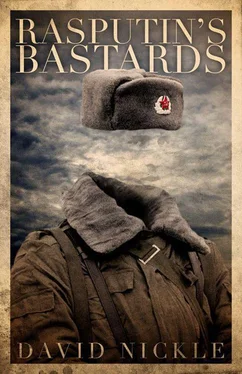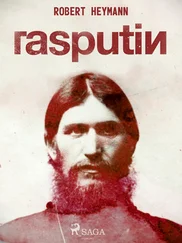“If I join with you,” he said, “I’ll have surrendered to you. You’re too powerful in this place. And my Children — my beautiful Children — will finally be lost to me. They’ll become your playthings.”
Ours , said Lena.
“ Our playthings, then? See? You admit it. But that is not why I risked so much to bring them to me.”
Fyodor , she said, her eyes ablaze with cold blue fire, you risked too much for a thing you may never have .
A rumbling came over the world then, and he realised with a horrible twist in his gut that here in the clouds, he’d misjudged the scale of things. He’d thought Lena was no more than a dozen metres off as she spoke with him. But no — she was much farther than that. She was a mountain face; a continent.
When one of her perfect hands finally reached him, fingers thick and long as rockets spread about him, and closed around him like a cage. The giant hand brought him closer to her eye, which stared at him through the spaces between those monstrous digits.
“Impressive,” said Kolyokov. “But if what you said is true — that we’re here in the Discourse, and this is just a metaphor you’ve made for me: then I’ve got nothing to fear from you. Everything — my dissolution, this — storm that you are. Just a metaphor. Just a dream. So what am I risking now, truly?”
My displeasure , she said simply.
And with that, the Goddess Lena lifted Fyodor Kolyokov over her head, to an altitude that would be in low orbit were this more than a metaphor, and with a snap of her wrist, flung him down through the clouds… down and down, until he plunged into the very deepest part of this metaphor’s ocean.
“ Je-sus .”
The word echoed and boomed through the sky where Kolyokov floated. He peered up into the darkness and shouted: “Hello! Who’s up there?”
“ This thing’s got nothing to do with us .”
Kolyokov frowned. The voice sounded, what? Italian? No. Not quite Italian though near to it. Italian-American, maybe.
An accent from an Italian-American twenty storeys high. Kolyokov treaded water and called out again. “Hey! Down here!”
“ What about the old man ?” Similar accent from a different speaker. Kolyokov shouted again, but he couldn’t compete.
“ The old man’s not here. Maybe he’s dead. But we got two out of three and that ain’t too bad. C’mon .”
Kolyokov stopped shouting then — because the next thing he heard was a clang that was unmistakable: the sound of the hatch on his isolation tank, swinging shut for one last time.
“Oh no,” he said to himself, looking around at the dark waves that danced around him. “Oh not this.”
It wasn’t long after that that those waves pulled him under, and the darkness of the ocean became complete.
When he lived, Fyodor Kolyokov did not preside over an organization so much as he did a distributed network. It was his great strength; in the final accounting, it became a paralyzing weakness.
The trouble was that most of the people who worked for Kolyokov had no idea they were doing so. They were stockbrokers and government officials and engineers — men and women who’d been placed here decades ago by the former Soviet intelligence machine, to infiltrate Western business and government. They had no idea who they were serving when the Soviet Union was extant — and now that it was gone, they had no clue they worked for Kolyokov.
But work they did. Or rather, they paid him a considerable tithe — pieces of the paycheques and dividends they’d amassed in their all-too-successful infiltration of the American establishment. That tithe was the firmament of Kolyokov’s wealth.
In Kolyokov’s absence, that firmament crumbled. The off-shore bank accounts, which rose and fell like a well-managed system of river locks, began to drain.
But that wasn’t as bad as it got.
Kolyokov’s distributed network was also a shield for him. Should the I.R.S. look too closely at one of his tax returns, his operatives there would see that the inquiry was ended before it had significantly begun. Should the City of New York begin to ask questions about some of the modifications and additions he’d built on the Emissary over the years — again, the matter would be closed.
And as for Kolyokov’s active enemies — well. Kolyokov himself saw to it that he and his material assets were covered in a cloak of invisibility, a great bank of fog that guaranteed inattention.
And yet — should an enemy arrive in the lobby of the Emissary — one who smelled weakness like a pheromone, and would pounce upon it like a ravaging Cossack — well, Kolyokov’s distributed network would converge upon that enemy in a heart’s beat, and if need be tear him limb from limb to protect Kolyokov and the network.
But Kolyokov was dead. The cloud was dissipating. And his distributed network of an organization was crumbling into ruin.
Leo Montassini stepped up to the threshold of the ruin, and squeezed the end of his cigarette between finger and thumb. Like everywhere else in Manhattan, the Emissary posted a “No Smoking” sign at the entrance to its front lobby. Montassini and his crew, Nino and Jack, would have enough to worry about with the hotel security later; there was no point in drawing attention at this early juncture. Smoke curled over his blunt fingertips like water, and he dropped the butt into an ashtray thoughtfully provided by the doors.
“Hey,” said Nino, squishing his own cigarette under his heel, “where’s the fuckin’ doorman? What hotel doesn’t have a doorman?”
Montassini shrugged. “What an interesting question.”
“I’m just saying.”
“What the fuck is this place anyway?” Jack was hanging back, looking at the sign that hung out over the sidewalk. “How come I never seen this fuckin’ hotel before?”
“Questions, questions.” Montassini rolled his eyes, to show his crew he didn’t want to hear questions right now. Particularly not good questions, like the ones Jack was raising. Yeah, Montassini wondered too: How come he’d never seen this place before either? This was Montassini’s territory — midtown east side. He knew all the businesses here. Montassini had a list in his head and he kept it up to date.
But when Gepetto Bucci got the call from the Turk, telling him to go over and see about snatching a couple three people — go to the Emissary Hotel at Broadway and 94th — all he could think was the stupid foreigners must have got the name wrong. There was no Emissary Hotel at Broadway and 94th.
Yet here he was. In the front lobby of the Emissary Hotel.
A hotel had sprung up between Sal’s Wine and Liquor Store and the Lucky Variety overnight. Right in front of his eyes.
“C’mon,” said Montassini. “We got a long day ahead of us.”
He pushed the door open with his shoulder, and led his crew through the lobby.
“Hey,” whispered Nino, “how come the desk clerk’s cryin’ like that?”
“How the fuck should I know?” said Montassini. He strode up to the desk.
“Hey!”
The desk man looked up. He wiped tears from his eyes.
“C-c-c-can I help?”
“Fuck yeah. I got to see—” Montassini reached into his pocket and produced a list. “Alexei Kilo-do-vich. He got a room here?”
The desk man looked at him. Tapped something on his computer.
“H-he’s not in,” said the man.
Montassini hefted himself up on the desk and looked at the computer screen. Wrote down the room number. The old man started to object, but sniffled instead.
“Fyodor Kolyokov.”
The old man backed away. Montassini leaned over and typed the name himself. Another number came up.
Читать дальше












